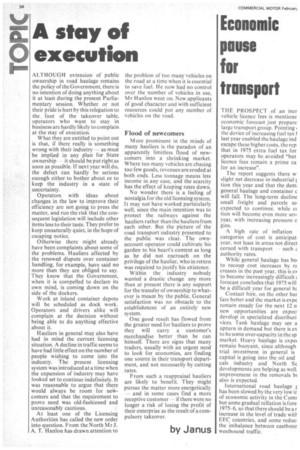A stay of
Page 36

If you've noticed an error in this article please click here to report it so we can fix it.
execution
ALTHOUGH extension of public ownership in road haulage remains the policy of the G overnment, there is no intention of doing anything about it at least during the present Parliamentary session. Whether or not their pride is hurt by this relegation to the foot of the takeover table, operators who want to stay in business are hardly likely to complain at the stay of execution.
What they are entitled to point out is that, if there really is something wrong with their industry — as must be implied in any plan for State ownership — it should be put right as soon as possible. If next year will do, the defect can hardly be serious enough either to bother about or to keep the industry in a state of uncertainty.
Operators with ideas about changes in the law to improve their efficiency are not going to press the matter, and run the risk that the consequent legislation will include other items less to their taste. They prefer to keep unnaturally quiet, in the hope of escaping notice.
Otherwise there might already have been complaints about some of the problems. Hauliers affected by the renewed dispute over container handling, for example, have said no more than they are obliged to say. They know that the Government, when it is compelled to declare its own mind, is coming down on the side of the dockers.
Work at inland container depots will be scheduled as dock work. Operators and drivers alike will complain at the decision without being able to do anything effective about it.
Hauliers in general may also have had in mind the current licensing situation. A decline in traffic seems to have had little effect on the number of people wishing to come into the industry. The present licensing system was introduced at a time when the expansion of industry may have looked set to continue indefinitely. It was reasonable to argue that there would always be room for newcomers and that the requirement to prove need was old-fashioned and unreasonably cautious.
At least one of the Licensing Authorities has called the new order into question. From the North M r J. A. T. Hanlon has drawn attention to the problem of too many vehicles on the road at a time when it is essential to save fuel. He now had no control over the number of vehicles in use, Mr Hanlon went on. New applicants of good character and with sufficient resources could put any number of vehicles on the road.
Flood of newcomers
M ore prominent in the minds of many hauliers is the paradox of an apparently limitless flood of newcomers into a shrinking market. Where too many vehicles are chasing too few goods, revenues are eroded at both ends. Less tonnage means less income in any case, and the scarcity has the effect of keeping rates down.
No wonder there is a feeling of nostalgia for the old licensing system. It may not have worked particularly well, since the main intention was to protect the railways against the hauliers rather than the hauliers from each other. But the picture of the road transport industry presented to the public was clear. The ownaccount operator could cultivate his garden to his heart's content as long as he did not encroach on the privilege of the haulier, who in return was required to justify his existence.
Within the industry nobody wanted a drastic change any more than at present there is any support for the transfer of ownership to whatever is meant by the public. General satisfaction was no obstacle to the establishment of an entirely new system.
One good result has flowed from the greater need for hauliers to prove they will carry a customer's merchandise better than he can himself. There are signs that many traders, usually with an urgent need to look for economies, are finding one source in their transport department, and not necessarily by cutting rates.
From such a reappraisal hauliers are likely to benefit. They might pursue the matter more energetically — and in some cases find a more receptive customer — if there were no longer a risk of losing the profit of their enterprise as the result of a compulsory takeover.
by Janus




























































































